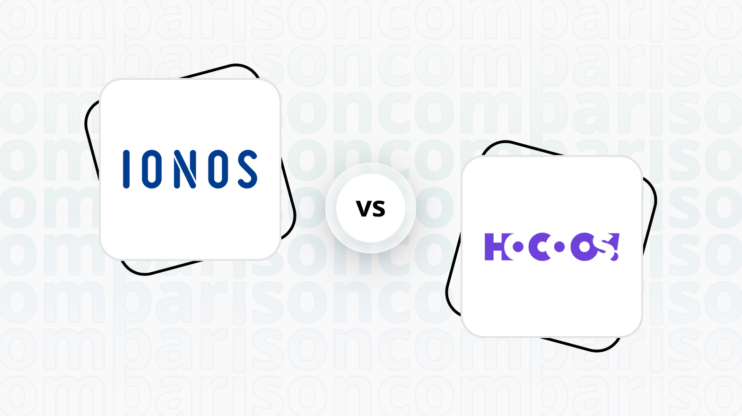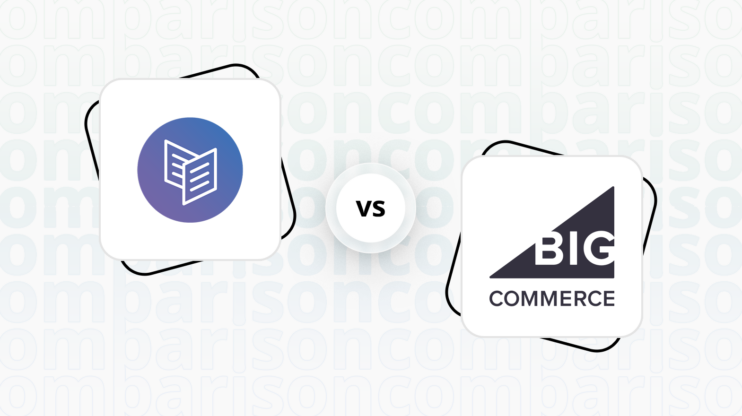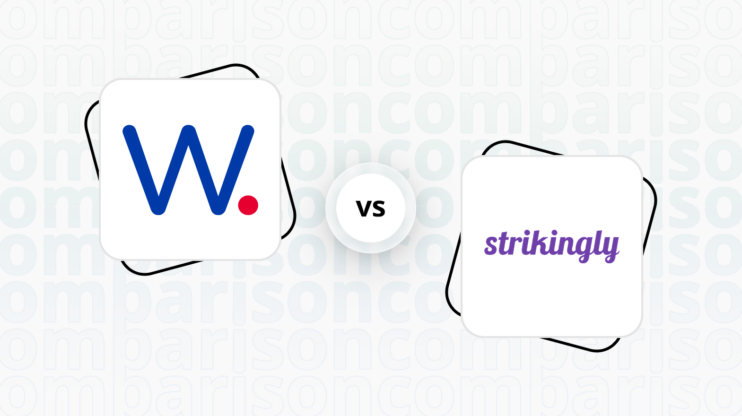Final verdict
Tilda and Web.com offer distinct advantages for users looking to build websites, but Tilda generally provides a more robust and versatile platform.
-
Tilda (Overall Grade: 6.7/10)
excels with its intuitive design functionalities, a wide range of templates, and superior customization options. It’s particularly strong in areas like ease of use, website editors, and plugins and integrations, making it a great choice for users who prioritize design flexibility and a rich set of features. Tilda’s approach to ecommerce, user management, and additional features like SSL certificates and mobile responsiveness further solidify its position as a versatile website builder suitable for a variety of needs. -
Web.com (Overall Grade: 5.8/10)
, while lagging slightly behind in overall score, offers competitive marketing features, customer support, and AI capabilities. It stands out for its website speed optimization and comprehensive marketing tools, including ads and promotions not found in Tilda. Web.com’s focus on AI-driven design and ecommerce features, alongside its strong customer support, makes it a viable option for users looking for an easy-to-use platform with solid marketing and AI tools.

|

|
|
|---|---|---|
|
Design functionalities & templates |
8.6 |
6.4 |
|
Ease of use |
8.0 |
6.4 |
|
Ecommerce |
7.2 |
6.3 |
|
Website Editors |
8.0 |
6.6 |
|
Product testing options |
5.9 |
0.2 |
|
Price |
8.0 |
7.4 |
|
Hosting quality |
6.2 |
5.9 |
|
Website speed optimization |
4.9 |
5.8 |
|
Plugins and integrations |
7.6 |
6.7 |
|
Marketing features |
6.9 |
7.0 |
|
Customer support |
5.5 |
7.3 |
|
Security |
7.6 |
7.6 |
|
AI capabilities |
2.1 |
7.3 |
|
User Management |
7.3 |
5.2 |
| Overall |
6.7 |
5.8 |
Best for ecommerce
 7.2
7.2
 6.3
6.3
Verdict
: For businesses focused on ecommerce, Tilda offers a more user-friendly and feature-rich environment compared to Web.com, despite Web.com’s broader marketing tools.
-
Tilda
: With a higher ecommerce score, Tilda shines for its ease of use and comprehensive ecommerce features, including versatile payment gateways and advanced product page customization. It’s particularly suited for users looking for a blend of design flexibility and ecommerce functionality. -
Web.com
: While it scores lower in ecommerce capabilities, Web.com provides essential tools for building an online store. It’s a viable option for those prioritizing simplicity and basic ecommerce features over extensive customization and advanced ecommerce tools.
Best for informational & business websites
 8.4
8.4
 6.5
6.5
Verdict
: Tilda outshines Web.com for informational and business websites, offering superior design flexibility, ease of use, and a comprehensive set of features tailored to creating visually appealing and functional sites.
-
Tilda
: With a score of 8.4, Tilda stands out for its focus on typography, visual content, and a wide array of pre-designed blocks that make it easy to build professional-looking websites without coding skills. Its integration capabilities further enhance its suitability for a broad range of business needs. -
Web.com
: Scoring 6.5, Web.com provides a user-friendly platform with a focus on mobile responsiveness and eCommerce capabilities. However, it falls short in offering the design flexibility and customization options available with Tilda, making it less ideal for those prioritizing unique, visually driven sites.
Detailed comparison
Design functionalities & templates
Design FunctionalitiesRepresents how well each platform allows for creative design and customization of websites.Score Components:
- Template Variety (30%): Range and quality of design templates.
- Customization (30%): Flexibility and options for design alterations.
- User Interface (20%): Ease and intuitiveness of the design process.
- Responsiveness (10%): Adaptability to different devices and screen sizes.
- Innovation (10%): Unique design features and tools.
 8.6
8.6
 6.4
6.4
Winner: Tilda.
Tilda offers a more diverse selection of design templates and a wider range of customization options, making it the preferred choice for users who want more creative control over their website design.
Tilda offers a diverse selection of design templates that are suitable for various types of content, all crafted by professional designers. These templates emphasize gorgeous typography, minimalist blocks, and striking images. Users have the flexibility to modify any template significantly or even start from scratch, ensuring the final website can meet a wide range of design preferences and requirements.
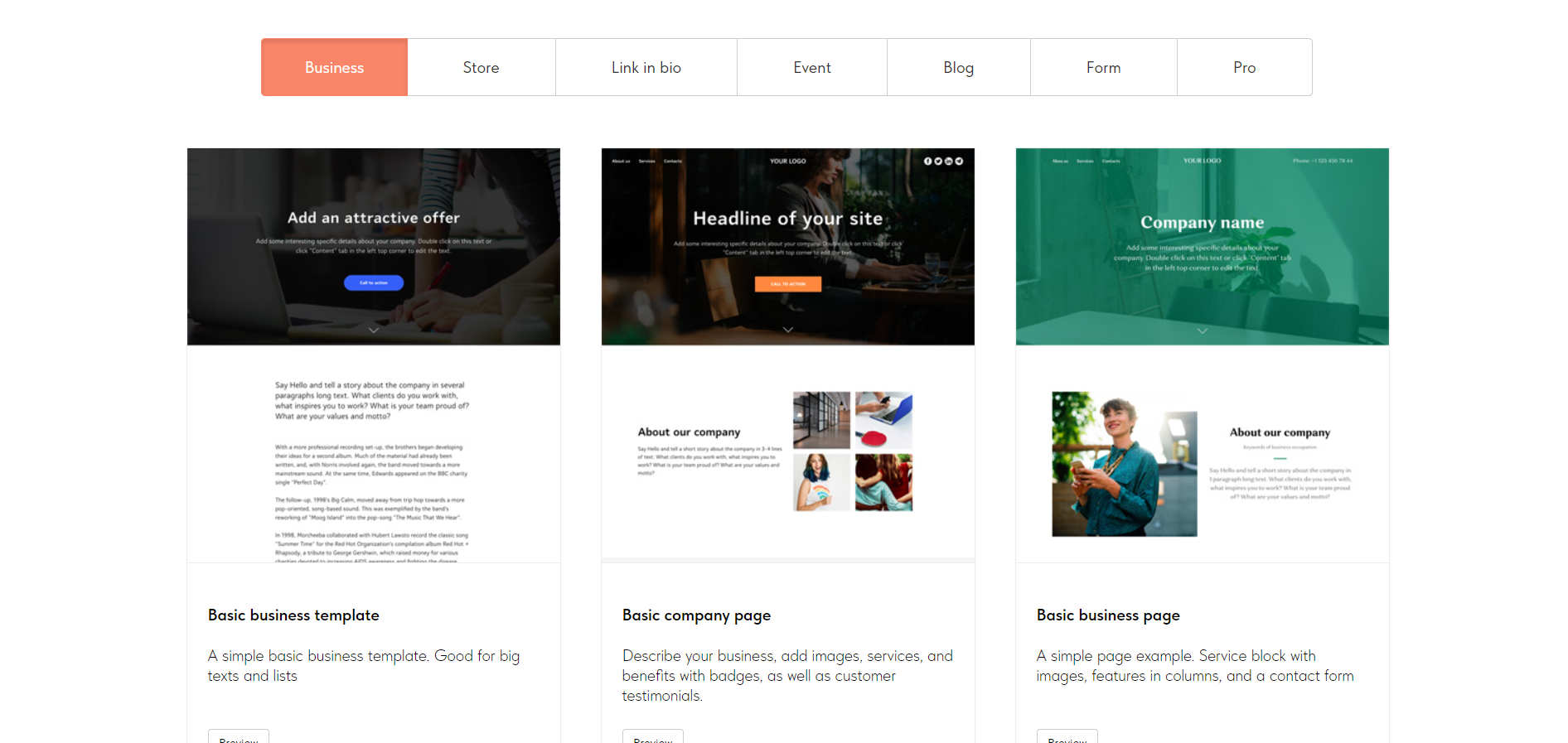
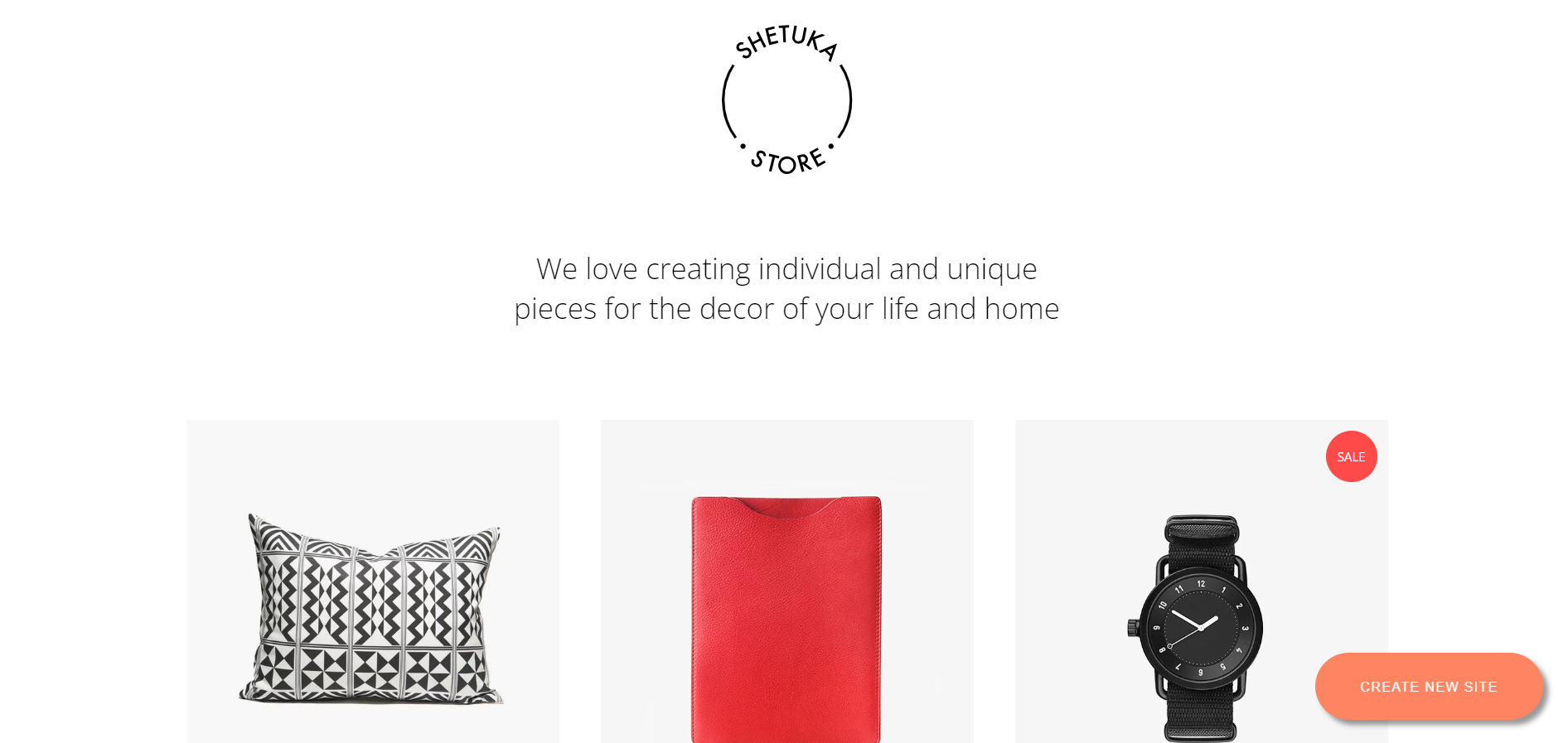
On the other hand, Web.com offers over 100 website templates designed to cater to a broad spectrum of industries and personalization needs. These templates are structured to be straightforward in customization, allowing users to easily adapt their chosen designs to suit their unique brand identity through the platform’s editor. However, while the platform facilitates template customization and offers numerous pre-made layouts, it may not provide the most advanced features for all customization desires.
Get a head start on website creation with AI
Create a custom website tailored to your business needs 10X faster with 10Web AI Website Builder!
Ease of use
Ease of useReflects the platform’s overall user-friendliness.Score
Components:
- Learning curve (40%): Quickness and ease of getting started.
- Interface design (30%): Simplicity and intuitiveness of layout.
- User guidance (20%): Quality of tutorials and support.
- Flexibility (10%): Adaptability to various user skills.
 8.0
8.0
 6.4
6.4
🏆 Winner: Tilda
. Scoring 8.0, Tilda is known for its intuitive drag-and-drop interface and a wide range of modern, responsive templates suitable for various industries. Web.com, with a score of 6.4, offers a range of customizable templates and a feature-rich editor, but may not be the best choice for complete beginners or professional designers looking for advanced tools.
Learning Resources
🏆 Winner: Tilda
. Tilda provides comprehensive resources and tools for users to create websites, online stores, and online courses without coding skills, focusing on design flexibility, content presentation, and SEO optimization. Web.com offers a range of AI-powered tools and a comprehensive knowledge base, but lacks SEO tools in its basic plan.
For ecommerce
EcommerceMeasures the platform’s effectiveness in supporting online business activities.Score Components:
- Ecommerce themes and templates (20%): Variety and design of templates.
- Product management (25%): Ease of managing and organizing products.
- Payment options (25%): Variety and convenience of payment methods.
- Ecommerce features (20%): Features for managing an ecommerce store.
- Integration (10%): Compatibility with external e-commerce tools and services.
 7.2
7.2
 6.3
6.3
Tilda and Web.com both offer ecommerce capabilities, but they cater to different needs and preferences. Tilda, with a score of 7.2, provides a user-friendly platform for creating ecommerce websites with features like ready-made templates, various payment system integrations, and SEO optimization. It supports inventory management, CRM for order tracking, and tools for email marketing and membership areas. On the other hand, Web.com, scoring 6.3, offers a suite of ecommerce features aimed at simplifying the creation and management of online stores, including AI-driven design options, customizable templates, and secure payment solutions.

|

|
|
|---|---|---|
|
Ecommerce themes and templates |
6.5 |
5.5 |
|
Product page customization |
7.0 |
6.0 |
|
Payment processing and commissions |
7.5 |
6.5 |
|
POS capabilities |
0.0 |
4.0 |
|
Payment gateways |
7.8 |
7.0 |
|
Product numbers |
6.0 |
5.0 |
|
Additional ecommerce features |
6.5 |
6.0 |
Tilda ecommerce features:
- Product Catalogs and Inventory management
- Payment Gateways integration
- Shipping options
- Order management
- Built-in CRM and marketing tools
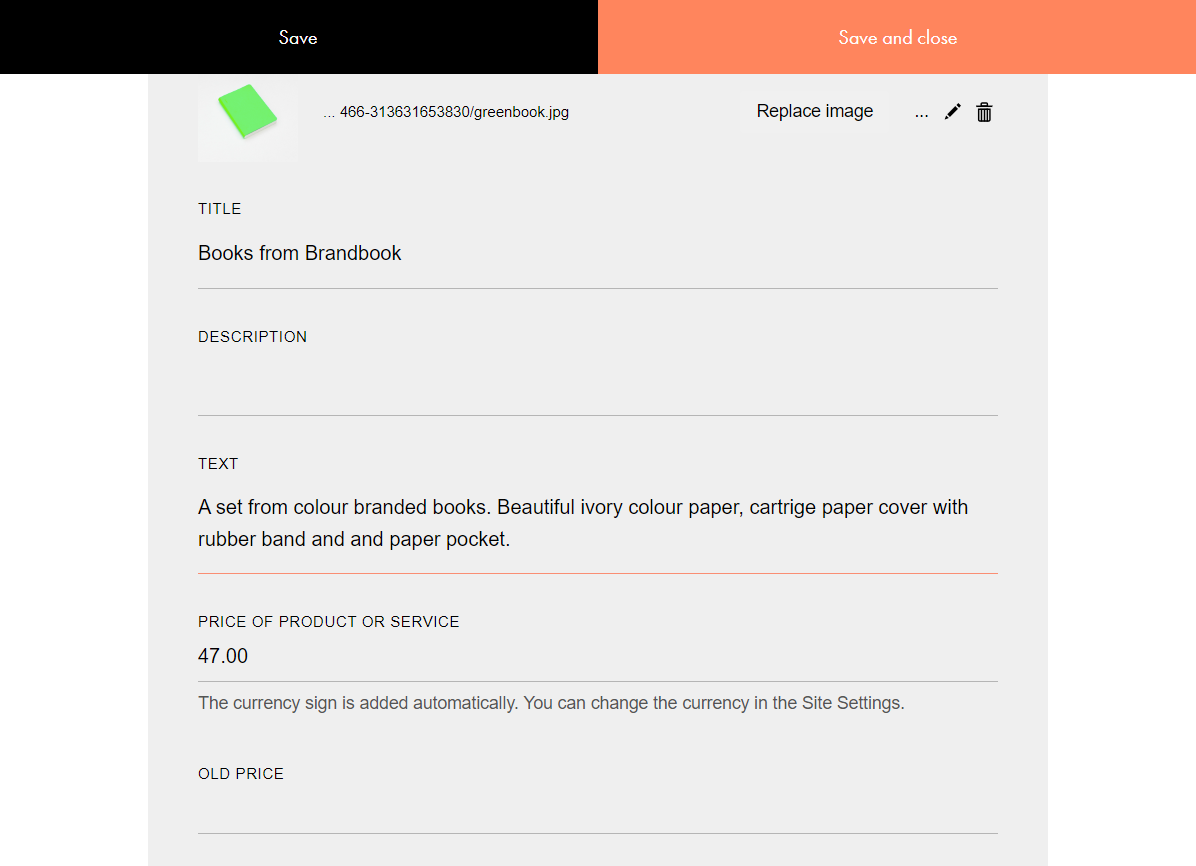
Web.com ecommerce features:
- Product listing
- Marketing Features
- Shipping options
- Payment Gateways integration
Ecommerce themes & templates
Tilda allows users to build their ecommerce sites using around 20 ready-made online store templates, emphasizing ease of use and the ability to create a store without needing coding or web design skills. Web.com, on the other hand, offers around 15 ecommerce templates designed to help businesses quickly launch and customize their online stores, emphasizing ease of use, cost-effectiveness, and professional design.
Product page customization
Tilda enables a wide range of customizations for product pages in online stores, including the design, ecommerce functionalities, and integration with external services. Features like product variants, delivery options, promotional codes, and diverse payment system integrations allow for a personalized shopping experience. Web.com’s website builder offers a suite of tools for ecommerce stores, including product category management for organizing inventory and improving navigation, and product listing features for adding detailed product information and images.
Payment processing
The Tilda website builder supports a variety of popular payment systems such as Stripe, PayPal, and 2Checkout, allowing for easy integration to accept online payments. Tilda does not impose additional transaction fees beyond those of the payment gateways themselves. Web.com’s website builder facilitates ecommerce activities by supporting popular payment gateways like PayPal, Stripe, and all major debit and credit cards, ensuring a wide array of payment options for customers. Details on transaction commissions, particularly whether Web.com imposes additional fees on transactions processed through these gateways, were not clearly stated in the reviewed sources.
Website Editors
Website EditorsEvaluates the platforms’ website building and editing capabilities.Score Components:
- Customization tools (40%): Range and power of editing features.
- Editor usability (30%): User experience within the editor.
- Design flexibility (20%): Freedom in layout and design changes.
- Update and maintenance ease (10%): Simplicity of updating and maintaining the site.
 8.0
8.0
 6.6
6.6
🏆
Winner: Tilda
. Tilda, with a score of 8.0, offers a user-friendly, block-based design approach that simplifies the process of creating websites without requiring in-depth coding knowledge. It features advanced customization options through its Zero Block feature, allowing for detailed control over design elements for those needing more specific layouts. The platform supports responsive design, ensuring websites are optimized for all devices, and includes built-in SEO tools, analytics, and a range of integrations with third-party services for extended functionality.
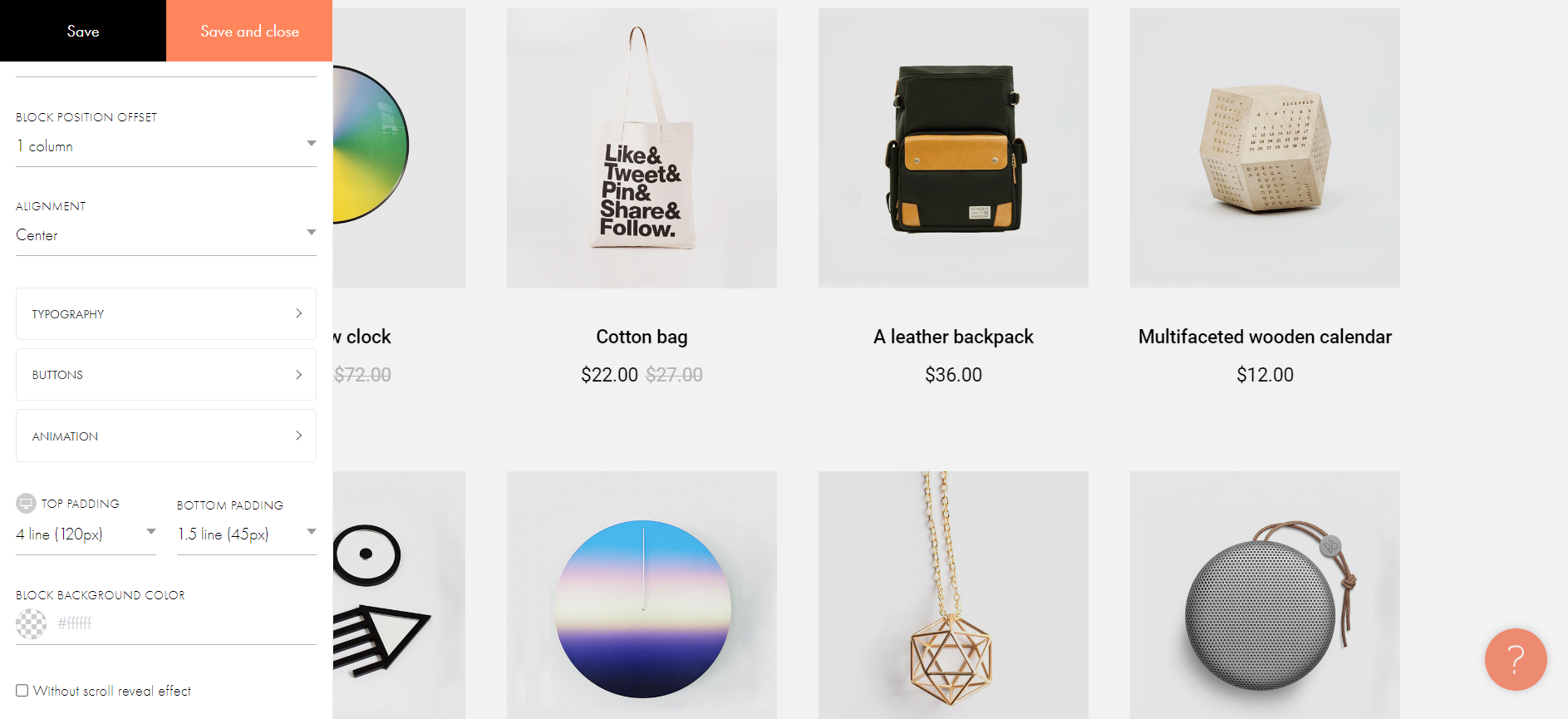
Web.com’s website builder, scoring 6.6, offers a user-friendly platform with a variety of templates and a drag-and-drop interface for easy customization. However, it has some creative limitations due to its row-based layout. It supports basic e-commerce capabilities suitable for small businesses, alongside features like analytics, social media integration, and email services. For more advanced functionalities like promotional pop-ups, calendars, or comprehensive blogging tools, the platform may fall short unless users are willing to add custom code.
Mobile editor/app
 5.5
5.5
 0
0
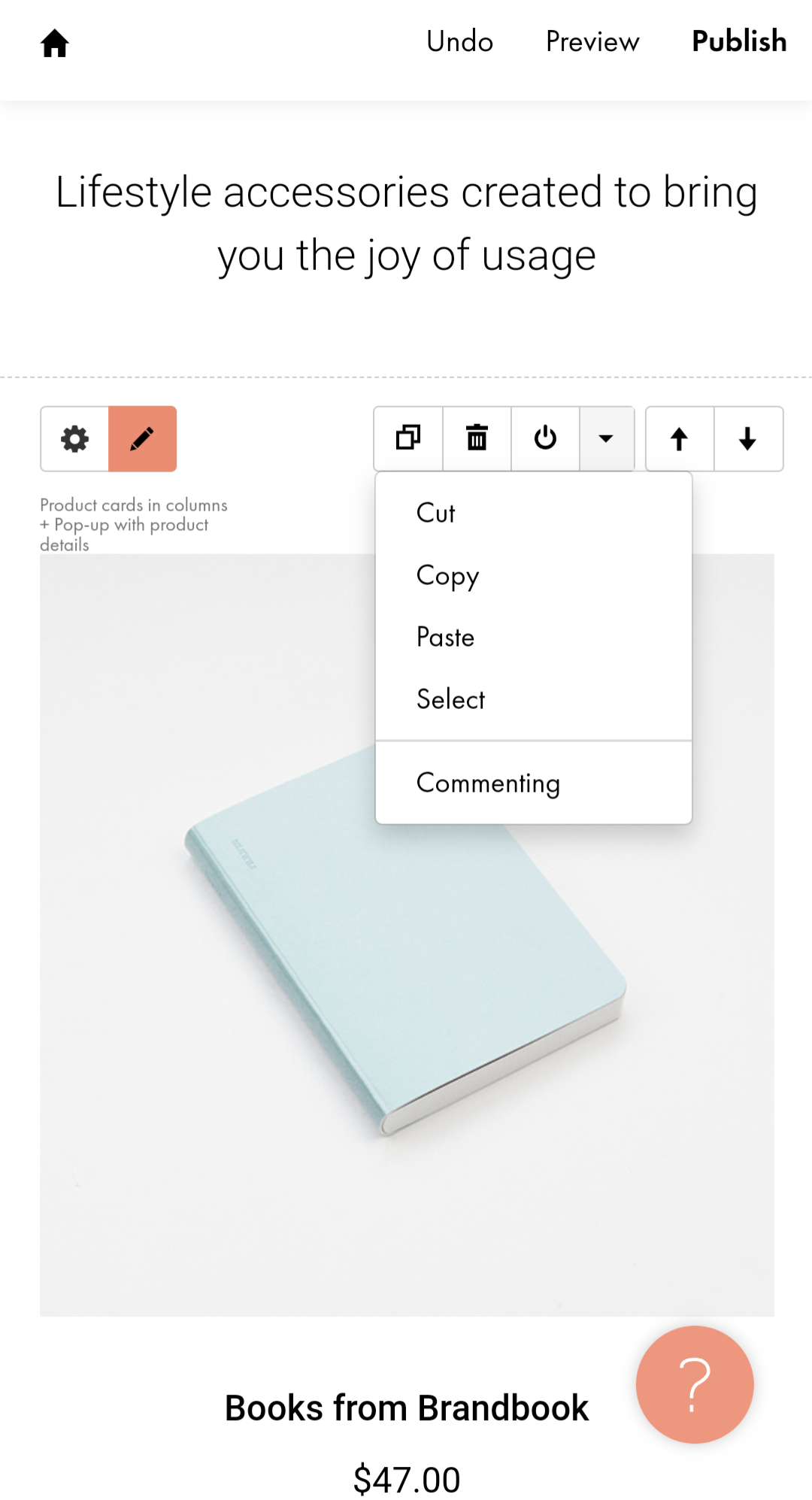
🏆
Winner: Tilda
. Neither Tilda nor Web.com offer a dedicated mobile editor app. However, Tilda allows users to manage and edit their websites using the mobile browser version of the editor. This gives Tilda an edge over Web.com in terms of mobile editing capabilities. Therefore, Tilda is the winner in this category.
Product testing options
Product Testing OptionsAssesses the options for trying out platform features before commitment.Score Components:
- Trial quality (40%): Extent and usefulness of the trial or free version.
- Feature accessibility (30%): How many features are available to test.
- Trial duration (20%): Length of the trial period.
- Ease of transition (10%): Smoothness of moving from trial to paid plans.
 5.9
5.9
 0.2
0.2
Overall Result
:
Tilda Wins
. Tilda scores 5.9 in product testing options, significantly higher than Web.com’s 0.2. Tilda offers a free version where some premium features can be tested, while Web.com does not provide any opportunity to test the features before purchasing a plan. However, Web.com offers a 3-day money-back guarantee.

|

|
|
|---|---|---|
|
Free Plan |
Yes |
No |
|
Trial Duration |
No | No |
|
Testing Premium Features |
Some features with free plan |
Not possible before purchasing a plan |
|
Money Back Guarantee |
No |
3-day money back guarantee |
Price
PriceLooks at the cost-effectiveness and value for money of each platform.Score Components:
- Plan value (40%): What each pricing tier offers.
- Transparency and clarity (30%): Clearness of pricing structures.
- Flexibility of plans (20%): Range of options to suit different budgets.
- Hidden costs (10%): Additional expenses not included in the plan.
 8.0
8.0
 7.4
7.4
Tilda and Web.com offer competitive pricing, but Web.com’s plans are slightly more expensive. However, Web.com offers a higher discount on annual billing, which can make it more affordable in the long run.

|

|
|
|---|---|---|
|
Free |
Free ($0/month): Tilda’s Free plan allows for 1 website with up to 50 pages per website and 50 MB of space per project. It includes a free subdomain on tilda.ws, responsive design on all devices, basic animations, a built-in image and icon library, and Tilda CRM. |
No offering at this amount. |
|
$10-$20 |
Personal ($15/month): The Personal plan offers 1 website with up to 500 pages and 1 GB of space. It includes all features of the Free plan plus the ability to connect a custom domain, advanced animations, full access to the Block Library, analytics, SEO tools, and online store capabilities. Value for price: 7.5 |
Website ($19.99/month): AI-powered Website Builder. Free domain & domain privacy for 1 year. Professional email for 3 months. SSL Certificate for 1 month. 1 hour expert design support. Social & email marketing tools. Value for price: 6.5 |
|
$20-$30 |
Business ($25/month): The Business plan expands capabilities to 5 websites per account, each with up to 500 pages and 1 GB of space, including source code export and API access. It builds upon the Personal plan features with additions suitable for more extensive business needs. Value for price: 9.0 |
Website + Marketing ($24.99/month): All features in the Website plan. Enhanced marketing tools. Appointment scheduling. Value for price: 7.0 |
|
$30+ |
No offering at this amount. |
eCommerce ($34.99/month): All features in the Website + Marketing plan. Online store with secure checkout. Sell on multiple marketplaces like Facebook, Instagram, Amazon, eBay, etc. Value for Price: 8.5 |
location. As a result in rare cases the prices displayed here can differ from the ones you see on their
websites.
Hosting quality
Hosting
qualityExamines the reliability and performance of the hosting solutions.Score Components:
- Uptime (40%): Consistency and reliability of website availability.
- Speed (30%): Loading times and performance.
- Bandwidth and storage (20%): Sufficiency of resources provided.
- Data centers (10%): Quality and distribution of hosting infrastructure.
 6.2
6.2
 5.9
5.9
🏆
Winner: Tilda
Tilda offers cloud hosting with up to 1GB storage capacity and a 99.9% uptime. On the other hand, Web.com provides shared hosting with unlimited storage but does not provide uptime statistics or guarantees. Both Tilda and Web.com do not disclose the locations of their data centers. Despite the lack of transparency about their data centers, Tilda’s cloud hosting and higher uptime give it an edge over Web.com.

|

|
|
|---|---|---|
|
Do they offer hosting? |
Yes, cloud hosting with up to 1GB storage capacity |
Yes, with unlimited storage and daily backups |
|
Type of hosting: |
Cloud Hosting |
Shared hosting |
|
Uptime: |
99.9% |
Not provided |
|
Uptime Guarantee: |
No |
Not provided |
|
Data Centers: |
Not disclosed |
Not disclosed |
Website Speed Optimization
Website Speed OptimizationEvaluates optimization of website loading timesScore Components:
- PageSpeed Score (30%): Google’s score indicating performance optimization.
- Loading Time (30%): The average time until a website is fully interactive.
- Mobile Optimization (15%): Optimization effectiveness for mobile devices.
- Resource Optimization (15%): Optimizing images, scripts, and other heavy resources.
- CDN Usage (10%): Use of CDN to enhance speed across geolocations.
 4.9
4.9
 5.8
5.8
🏆 Winner: Web.com
Both Tilda and Web.com have strategies in place for website speed optimization, but Web.com has a slightly higher score in this area.

|

|
|
|---|---|---|
|
Key Strategies |
Lazy Loading, Image Optimization |
Mobile Optimized design, Code Minification, Caching, Image Optimization |
|
Load Times |
Varies depending on optimization and website complexity |
Varies depending on optimization and website complexity |
|
Page Speed Scores Range |
Varies depending on optimization and website complexity |
Varies depending on optimization and website complexity |
|
Core Web Vitals Improvement |
No information provided |
No information provided |
Web.com’s strategies for speed optimization include mobile-optimized design, code minification, caching, and image optimization. These strategies, combined with the fact that load times and PageSpeed scores vary depending on optimization and website complexity, give Web.com a slight edge over Tilda in terms of website speed optimization.
Tilda, on the other hand, focuses on lazy loading and image optimization as their main strategies for speed optimization. Like Web.com, Tilda’s load times and PageSpeed scores also vary depending on optimization and website complexity. However, Tilda does not provide any information on their Core Web Vitals improvements, which could be a potential area for improvement.
Get a head start on website creation with AI
Create a custom website tailored to your business needs 10X faster with 10Web AI Website Builder!
Plugins and integrations
Plugins and integrationsMeasures the range and effectiveness of additional plugins and integrations.Score Components:
- Variety of options (40%): Range of available add-ons.
- Integration smoothness (30%): Ease of integrating plugins into the site.
- Quality of plugins (20%): Functionality and reliability of the options.
- Custom integration capabilities (10%): Support for custom or third-party integrations.
 7.6
7.6
 6.7
6.7
🏆 Winner: Tilda.
With a score of 7.6, Tilda offers a diverse range of integrations that enhance the functionality of websites created on its platform. It supports popular payment processors, integrates with various services for forms, and connects with Google Analytics and Google Tag Manager for in-depth website analytics. Web.com, scoring 6.7, also provides a suite of plugins and integrations, including features for email marketing, social media engagement, analytics, and eCommerce capabilities. However, more sophisticated features or premium plugins might require an upgrade to higher-tier plans or involve additional fees.
Marketing Features
Design FunctionalitiesRepresents how well each platform allows for creative design and customization of websites.Score Components:
- Template Variety (30%): Range and quality of design templates.
- Customization (30%): Flexibility and options for design alterations.
- User Interface (20%): Ease and intuitiveness of the design process.
- Responsiveness (10%): Adaptability to different devices and screen sizes.
- Innovation (10%): Unique design features and tools.
 6.9
6.9
 7.0
7.0
🏆
Overall Winner: Web.com
. Web.com slightly edges out Tilda with a more comprehensive set of marketing tools, including ads and promotions, which Tilda lacks. Both platforms offer SEO tools, email marketing, blogging, social media integration, and analytics and reporting, but Web.com’s additional features give it the upper hand.

|

|
|
|---|---|---|
|
SEO Tools |
|
|
|
Email Marketing |
|
|
|
Blogging |
|
|
|
Social Media Integration |
|
|
|
Analytics and Reporting |
|
|
|
Ads and Promotions |
|
|
Customer Support
Customer supportEvaluates the quality and availability of support options.Score Components:
- Response time (40%): Speed of support responses.
- Support quality (30%): Effectiveness and helpfulness of the support.
- Availability (20%): Range of support channels (phone, chat, email).
- Resource richness (10%): Quality of self-help and educational materials.
 5.5
5.5
 7.3
7.3
🏆 Winner: Web.com
. Web.com takes the lead in this category with a customer support score of 7.3, compared to Tilda’s 5.5. Web.com offers comprehensive customer support through various channels, including email, live chat, and 24/7 phone support. This ensures that users can find help whenever they need it, making it a reliable option for immediate support needs.
On the other hand, Tilda provides customer support mainly via email and does not specify the hours or availability of this support. The platform suggests that users consult the comprehensive articles and tutorials in Tilda’s Help Center for self-help options. However, the lack of immediate support channels and specified support hours puts Tilda at a disadvantage in this category.
Security
SecurityLooks at the platforms’ security measures and data protection.Score Components:
- Data protection (40%): Safeguards for user and customer data.
- SSL and encryption (30%): Implementation of secure connections.
- Compliance (20%): Adherence to industry security standards.
- Regular updates (10%): Frequency of security updates and patches.
 7.6
7.6
 7.6
7.6
🏆
Draw: Tilda and Web.com
. Both Tilda and Web.com have a security score of 7.6, indicating that they offer similar levels of security.
Tilda focuses on GDPR compliance and provides features for cookie consent, privacy policies, GDPR-friendly forms, and options for managing data retention and deletion. It also offers built-in security features such as DDoS prevention and HTTPS encryption to safeguard user data.
On the other hand, Web.com offers a range of services focused on private data storage and protection, including website staging environments and email solutions like Google Workspace and business email hosting. It also provides website security measures through its partnership with SiteLock Security, which offers cloud-based security services that scan websites for malware and vulnerabilities, automatically remove malicious content, and address potential security risks to ensure website safety.
AI Capabilities
AI capabilitiesMeasures the effectiveness of AI-driven features and tools.Score Components:
- Automation efficiency (40%): Impact of AI on streamlining processes.
- Personalization (30%): AI-driven customization for users or customers.
- AI-Assisted design (20%): Role of AI in website design and functionality.
- Data analysis (10%): Use of AI in interpreting user data and analytics.
 2.1
2.1
 7.3
7.3

|

|
|
|---|---|---|
|
AI Website Builder |
|
Web.com’s AI website builder simplifies the website creation process |
|
AI Ecommerce Features |
|
Web.com’s AI ecommerce features enhance the online shopping experience |
|
AI Content Generation |
Tilda’s AI feature generates website content |
Web.com’s AI Writer is a versatile tool for content creation |
|
Additional AI Features |
|
Web.com offers additional AI features like the AI Domain Generator and AI Logo Builder |
🏆 Winner: Web.com
. Web.com, with a score of 7.3, offers a comprehensive suite of AI tools, including an AI website builder, AI ecommerce features, and additional AI features. These tools are designed to simplify the website creation process and enhance the online shopping experience.
Tilda, with a score of 2.1, has limited AI capabilities, focusing mainly on content generation. While this feature can be useful, it does not match the breadth of AI tools offered by Web.com.
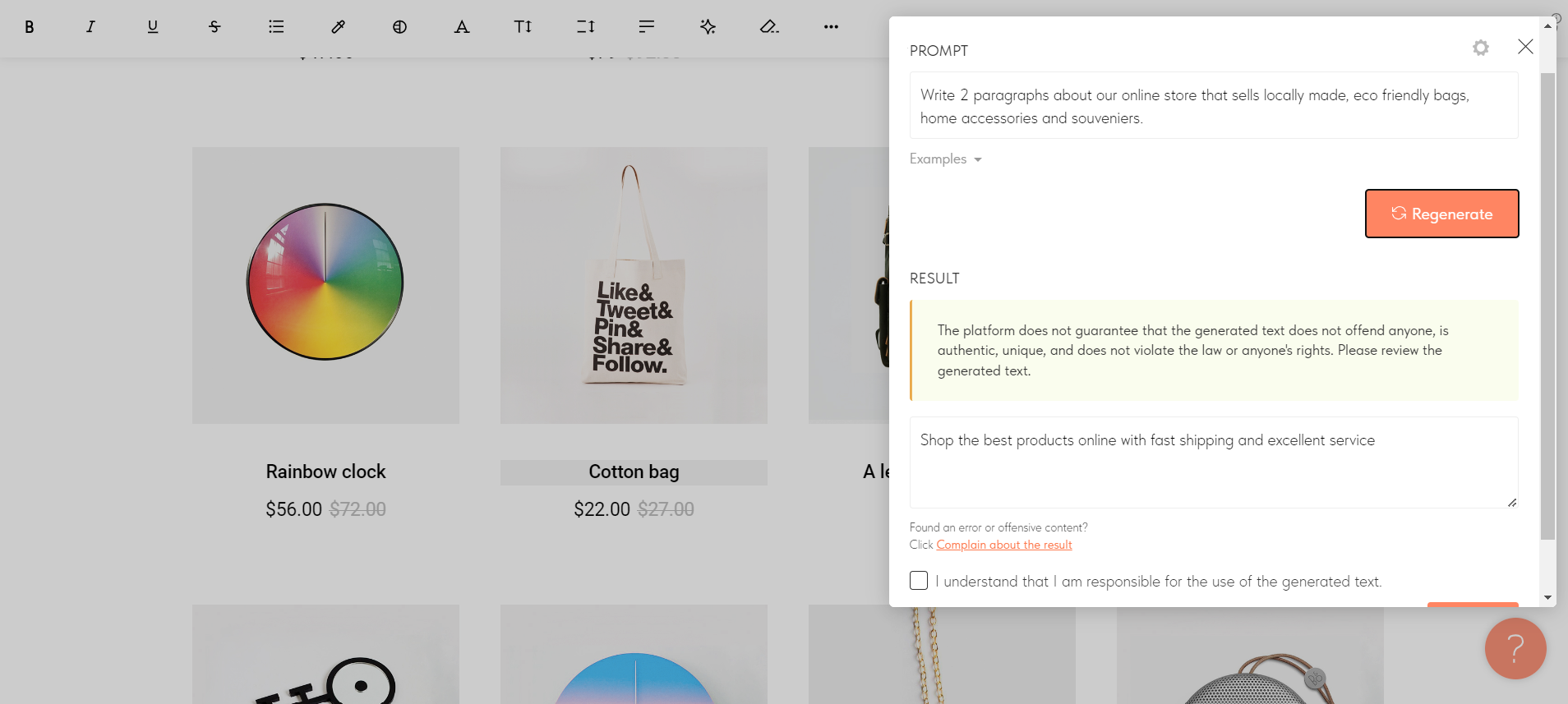
User Management
User ManagementAssesses the platforms’ capabilities in managing user roles, permissions, and accessibility.Score Components:
- Role Customization (40%): Flexibility in creating and defining user roles and
permissions. - Ease of Management (30%): User interface and tools for managing users.
- Access Control (20%): Effectiveness of access control measures for different user
levels. - Scalability (10%): Ability to manage a growing number of users efficiently.
 7.3
7.3
 5.2
5.2
🏆 Winner: Tilda
. Tilda and Web.com both offer user management features, but Tilda’s Collaborators feature provides more flexibility and control.
- Tilda allows adding teammates with either Full or Limited access. Full access enables collaborators to edit, publish, delete pages, view requests and statistics, and make changes to built-in website services. Limited access allows the project owner to specify what actions the collaborator can perform. This feature is available as a premium offering, and adding more collaborators requires additional payment.
- Web.com allows multiple user accounts, however the platform does not specify how many accounts are supported.
Web.com User Roles and Access Levels:
| Role | Description | Access Highlights |
|---|---|---|
| Primary | The main account holder or primary user. | Edit primary user info Purchase products Manage and renew products and services |
| Admin | Users with administrative privileges besides the primary. | Edit payment information Add/Edit/Delete user roles Manage and renew products and services Edit WHOIS Admin and Tech user info |
| Tech | Users with technical responsibilities. | Manage and renew products and services Edit WHOIS Admin and Tech user info |
Additional Features

|

|
|
|---|---|---|
|
SSL Certificate |
|
|
|
Custom Domain |
|
|
|
Free Custom Domain Included |
|
|
|
International Domains |
|
|
|
Mobile Responsive |
|
|
|
Page Speed |
|
|
|
Website Builder Mobile App |
|
|
|
Convert a Website To An App |
|
|
|
Website Analytics |
|
|
|
Multilingual Sites |
|
|
|
Multiple Users |
|
|
User Feedback
Tilda Publishing receives varied feedback from users, highlighting its strengths in offering a no-code, customizable website building experience with features like Zero Block for personalization and easy backend setup. Users appreciate its affordability, user-friendly interface, and responsive customer support. However, criticisms include buggy font customization, limited design elements, and instability in some of its features. Despite these drawbacks, many find Tilda beneficial for creating professional websites quickly and managing multiple sites under one plan, although some users advise caution due to issues with stability and customer support.
Unfortunately, there is no user feedback available for Web.com on the G2 platform, making it difficult to provide a comprehensive comparison based on user experiences.
The making of this blog
We followed a clear, step-by-step process to write and research this article.
FAQ
Which platform is better for beginners, Tilda or Web.com?
Can I use both Tilda and Web.com for selling products online?
How do Tilda and Web.com differ in terms of customization and design flexibility?
What are the major differences in pricing between Tilda and Web.com?
Which platform offers better customer support, Tilda or Web.com?











